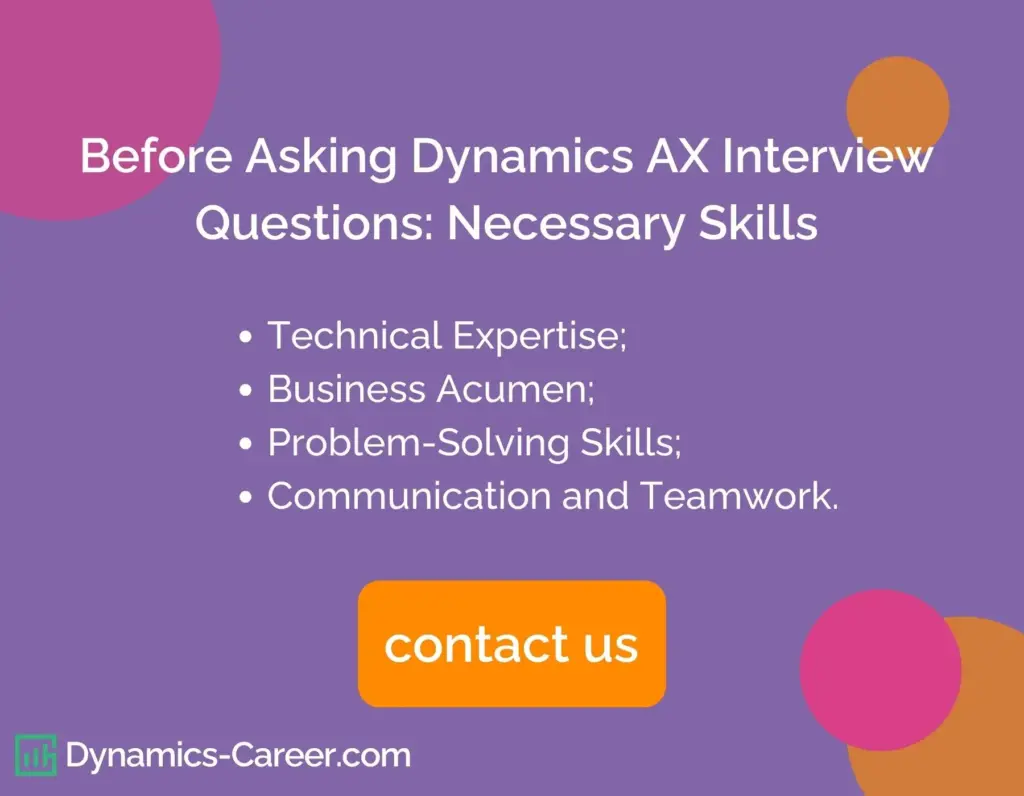Understanding Dynamics AX and the Importance of Hiring the Right Developer
Microsoft Dynamics AX, now known as Dynamics 365 for Finance and Operations, is a multi-language, multi-currency enterprise resource planning (ERP) solution. Its comprehensive capabilities in financials, human resources, and operations management make it a go-to choice for many organizations. When searching for a Dynamics AX developer, it’s not just about technical know-how; it’s about finding someone who can truly leverage the system to meet your unique business needs. This process involves asking the right Dynamics AX interview questions and understanding what makes a candidate stand out. For instance, during an interview on Microsoft Dynamics AX, probing into their problem-solving approach and ability to adapt to new versions of the platform is essential.

As we delve deeper into the subject, it’s important to recognize that the questions to ask in an interview for a Dynamics AX developer go beyond technical skills. They encompass a candidate’s ability to understand business processes and to communicate effectively with different stakeholders. This holistic approach in hiring these professionals ensures not just a skilled technician, but a valuable team member who contributes to the strategic objectives of your organization.
In summary, the right candidate can be a pivotal asset to your team, making the hiring process a critical task. By focusing on targeted Dynamics AX developer interview questions and understanding the multifaceted role these professionals play, you can make an informed and effective hiring decision.
Understanding Dynamics AX: Features, Functions, and the Developer’s Role
As a part of the Dynamics 365 suite, it represents an advanced ERP solution tailored for medium to large-sized enterprises. It integrates core business functions such as finance, human resources, and operations, streamlining processes and enhancing efficiency.
Key Features and Functionalities of Dynamics AX:
- Financial Management: it offers robust financial tools to manage ledgers, inventories, bank accounts, and budgets, ensuring comprehensive financial reporting and analysis.
- Supply Chain Management: It provides capabilities for managing procurement, sales, logistics, and inventory, optimizing the supply chain from procurement to delivery.
- Human Resource Management: The platform includes HR functionalities like employee management, payroll, and recruitment, aligning HR processes with business goals.
- Project Management: it supports project planning, resource allocation, and budgeting, offering real-time insights for effective project management.
- Business Intelligence and Reporting: With advanced BI tools, it delivers meaningful insights through data analytics and reporting, aiding informed decision-making.
- Manufacturing: It supports both discrete and process manufacturing, streamlining operations from planning to production and quality control.

The role of such a specialist in an organization is multifaceted. Primarily, they are responsible for customizing and configuring the system to meet specific business needs. This includes developing new functionalities, integrating AX with other systems, and maintaining the overall health of the ERP system. They play a crucial role in ensuring that the system is not only functional but also optimized to support business processes effectively.
Moreover, they must stay abreast of the latest updates and features, which often leads to questions about their adaptability and continuous learning capabilities in an interview, akin to the CRM Dynamics interview questions. Their ability to understand and implement new features is vital for keeping the system up-to-date and aligned with evolving business needs.
It’s not just a technical expert but a strategic partner who aids in leveraging the full potential of the Dynamics AX system. Their expertise and insights are crucial for the seamless operation and continuous improvement of the system, directly impacting the organization’s efficiency and success.
Preparing for the Dynamics AX Interview: Questions to Identify Skills. Crafting Effective Job Description
The process of conducting a Dynamics AX interview requires a keen understanding of the necessary skills and experience. Knowing what to look for and how to frame it in a job description is crucial for attracting the right candidates.
Identify Necessary Skills Before Asking Dynamics AX Interview Questions:
- Technical Expertise: Candidates should have a strong background in this technology, including familiarity with its latest versions. This includes skills in X++, MorphX, and other relevant fields.
- Business Acumen: Understanding business processes and how D365 AX supports them is essential. Candidates should demonstrate an ability to translate business requirements into technical solutions.
- Problem-Solving Skills: Look for candidates who exhibit strong analytical and problem-solving abilities. They should be adept at diagnosing and resolving system issues.
- Communication and Teamwork: Effective communication and teamwork skills are vital, as developers often work closely with other IT professionals and stakeholders.

Crafting Effective Job Descriptions:
- Use specific keywords like ‘hire Microsoft Dynamics AX developer’ or ‘Dynamics AX developer interview questions’ to target the right audience.
- Clearly outline the responsibilities and expectations, incorporating terms like ‘Dynamics AX interview takers’ to indicate the level of expertise required.
- Highlight desirable skills, such as experience in answering complex interview questions on Dynamics AX or Microsoft AX Dynamics interview questions.
Importance of Understanding The Technology for Effective Interviewing:
- Having a solid grasp of D365 allows interviewers to ask relevant and probing questions. This can include scenario-based Dynamics AX interview questions to assess practical knowledge.
- Understanding the platform enables interviewers to evaluate the candidate’s responses effectively, especially when discussing technical challenges and solutions.
Preparing for a Dynamics AX interview to hire a developer involves a thorough understanding of the necessary skills, crafting a clear and targeted job description, and having a solid grasp of its functionalities. This preparation is key to identifying the right candidate who can contribute effectively to your organization’s needs.
Ultimately, the decision to hire Microsoft Dynamics AX developers hinges on a comprehensive evaluation process. This includes assessing technical skills through targeted interview questions, understanding the candidate’s approach to Dynamics AX customization, and evaluating their compatibility with your organization’s culture and values.
Core Microsoft Dynamics AX Interview Questions
When interviewing for MS Dynamics AX jobs, it’s crucial to ask questions that reveal a candidate’s technical expertise, problem-solving skills, and practical experience. Below are specific questions and suggested answers for each category, designed to be practical and useful in the hiring process.
Moreover, preparing questions to ask in an interview for a Dynamics AX developer is a strategic step in the recruitment process. These questions should be designed to reveal the candidate’s depth of experience, their problem-solving approach, and their adaptability to evolving business needs.
Specific Technical Questions
1. Can you explain the architecture of Dynamics AX?
- Expected Answer: The candidate should mention its layered architecture, including the Application Object Server (AOS), the database server, and the client. They should be familiar with the model-driven architecture and how it supports customization and development.
2. How do you handle performance tuning in Dynamics AX?
- Expected Answer: Look for answers that mention identifying performance bottlenecks using tracing and monitoring tools, optimizing X++ code, and using best practices for SQL Server optimization.
3. Describe the process of integrating Dynamics AX with other systems.
- Expected Answer: The candidate should talk about using Application Integration Framework (AIF), data entities, and services for integration. Mention of RESTful APIs and data import/export framework would also be relevant.
Scenario-Based Questions to Assess Problem-Solving Skills
1. How would you resolve a situation where a custom module in Dynamics AX is causing system performance issues?
- Expected Answer: Candidates should outline steps to identify the problematic code, use performance tools, and implement optimization techniques. They might also discuss liaising with the development team and users for testing and feedback.
2. A client wants a customized report that isn’t available in the standard Dynamics AX suite. How would you approach this request?
- Expected Answer: Expect an answer that includes gathering detailed requirements, designing the report using SSRS or another reporting tool, testing, and deploying the report within Dynamics AX.
Dynamics AX Interview Questions to Gauge Experience with Past Projects
1. Can you describe a challenging Dynamics AX project you worked on and how you addressed the challenges?
- Expected Answer: Look for detailed examples showing the candidate’s role, the specific challenges faced (like custom development or integration issues), and how they overcame them.
2. Have you been involved in an upgrade or migration project for Dynamics AX? What was your role?
- Expected Answer: Candidates should describe their involvement in planning, executing, and managing the upgrade or migration process, including handling data migration, customizations, and testing.
These questions are designed to delve deeply into the candidates’ technical knowledge, problem-solving abilities, and hands-on experience with Dynamics AX. Their answers will provide valuable insights into their suitability for the jobs.
Advanced Dynamics AX Developer Interview Questions
For hiring advanced Dynamics AX developers, the interview questions should focus on in-depth technical knowledge, customization and integration capabilities, and understanding of advanced features. These questions, along with expected answers, are designed to be practical and useful in the hiring process.
In-depth Technical Questions for Experienced Candidates
1. Explain the process of creating and deploying a new service in Dynamics AX.
- Expected Answer: The candidate should discuss creating a service in the AOT, and defining service operations, parameters, and data contracts. They should also mention deploying the service through the AOT and managing it using the Services form.
2. How do you manage batch processing and handle errors in Dynamics AX?
- Expected Answer: Look for answers that discuss setting up batch groups, creating batch jobs, and scheduling them. The candidate should also mention error-handling strategies, such as using try-catch blocks and reviewing batch job history.
Discussion on Customization and Integration
1. Describe a complex customization you’ve implemented in Dynamics AX.
- Expected Answer: The candidate should detail a specific scenario where they customized it, discussing the challenges and how they achieved the customization, possibly mentioning X++ code modifications, workflow customizations, or UI changes.
2. How would you approach integrating Dynamics AX with an external CRM system?
- Expected Answer: Candidates should talk about using data entities for data export/import, utilizing AIF, or creating custom services for integration. They might also mention leveraging OData services for real-time integration.
Evaluating the Candidate’s Understanding of Advanced Dynamics AX Features
1. Can you explain the role of the Model Store in Dynamics AX and how you manage it?
- Expected Answer: The candidate should mention that the Model Store is a database that stores application elements. They should be familiar with managing models using the AX Management Shell and the impact of model store operations on system performance.
2. Discuss implementing and managing security roles in Dynamics AX.
- Expected Answer: Expect a detailed answer on creating new security roles, assigning permissions, and using the Security Configuration form. The candidate might also discuss the use of role-based security to align with organizational structures.
These advanced questions aim to assess the candidates’ depth of knowledge, focusing on technical, customization, and advanced feature aspects. Their responses will provide insight into their expertise in handling complex scenarios and challenges in development.
Microsoft Dynamics AX Interview Questions: Assessing Key Soft Skills
In the process of hiring a candidate, it’s essential to go beyond technical prowess and evaluate key soft skills. Effective communication and teamwork are crucial in ensuring successful project outcomes. Here are some pertinent questions and expected answers to gauge these skills.
Questions to Gauge Communication and Teamwork Skills
1. How have you effectively communicated complex Dynamics AX technical issues to non-technical team members?
- Expected Answer: Candidates should provide examples demonstrating their ability to break down complex technical jargon into simpler terms, ensuring clarity and understanding among diverse team members.
2. Can you describe a time when you had to collaborate with a team to solve a Dynamics AX challenge?
- Expected Answer: Look for answers that highlight the candidate’s ability to work as part of a team, their role in the collaborative process, and how they contributed to finding a solution.
3. How do you adapt to different team dynamics while working on Microsoft AX Dynamics projects?
- Expected Answer: The ideal response would include examples of adaptability, showing flexibility in different team environments, and the ability to adjust their approach to work effectively with various personalities and work styles.
In hiring for Microsoft Dynamics AX jobs, these soft skills are as important as technical expertise. They ensure the developer can not only manage systems but also effectively communicate and collaborate within the organizational framework.
Beyond the Interview: Final Steps in Hiring a Microsoft Dynamics AX Developer

Reference Checks and Verifying Credentials
After conducting interviews, the next crucial step in hiring a Dynamics AX developer involves reference checks and credential verification. It’s essential to confirm the candidate’s past work experiences and the authenticity of their technical qualifications. This can include contacting previous employers to verify the candidate’s role, responsibilities, and performance, particularly in handling projects. Additionally, validating relevant certifications or degrees ensures the candidate has the formal training and knowledge claimed in their application.
Decision-Making Process in Hiring
The candidate should balance technical expertise with soft skills and cultural fit. Employers should consider how well the candidate’s experience aligns with the specific Dynamics AX developer job requirements and their potential for growth and adaptability within the organization. It’s also important to reflect on the candidate’s problem-solving approach and their ability to communicate and collaborate effectively, as these are key to successful project implementation.
Wrapping Up
Hiring the right Microsoft Dynamics AX developer is a meticulous process that extends beyond evaluating technical skills in an interview. It involves a thorough assessment of a candidate’s overall fit for the role, including their past experiences, credentials, and ability to integrate into the team and company culture. By carefully considering these factors, employers can make informed decisions that contribute to the successful implementation and management of Dynamics AX systems, ultimately driving organizational success.

FAQs about Dynamics AX Interview Questions
What technologies should I ask about when planning Dynamics AX Interview questions?
It’s important to look for a combination of technical and soft skills. Technical skills should include expertise in CRM & ERP (or Dynamics 365 for Finance and Operations), X++, MorphX, and a strong understanding of ERP concepts. Soft skills such as effective communication, problem-solving abilities, and teamwork are equally important. Experience in customizing and integrating AX with other systems is also a valuable asset.
How can I ensure that the developer I hire will be a good cultural fit for my team with Dynamics AX Interview Questions?
To ensure a good cultural fit, it’s crucial to assess a candidate’s soft skills, work ethic, and adaptability during the interview process. Asking about their previous team experiences, their approach to handling conflicts, and their adaptability to change can provide insights into their fit with your team’s culture. Additionally, consider their alignment with your organization’s values and their potential to contribute positively to the team dynamics.
What is the importance of conducting reference checks for Dynamics AX developer candidates?
Conducting reference checks is vital in the hiring process for any developer. It helps verify the candidate’s past work performance, technical skills, and professional conduct. Reference checks can provide insights into how the candidate applied their skills in real-world scenarios and how they interacted with team members and clients. This step is crucial for making an informed hiring decision and ensuring the candidate’s claims about their experience and skills are accurate.
